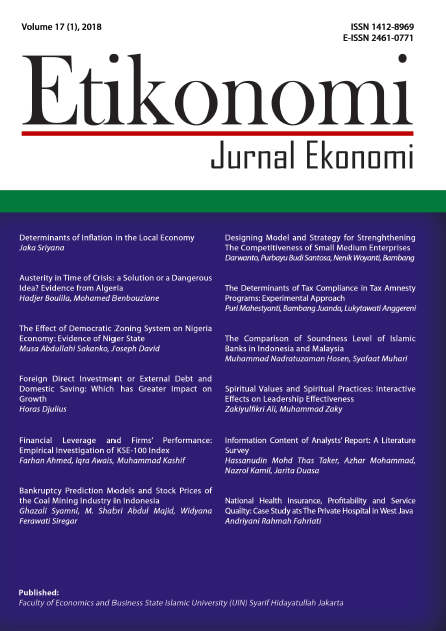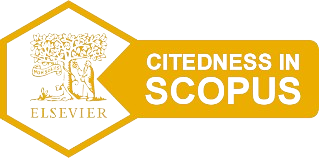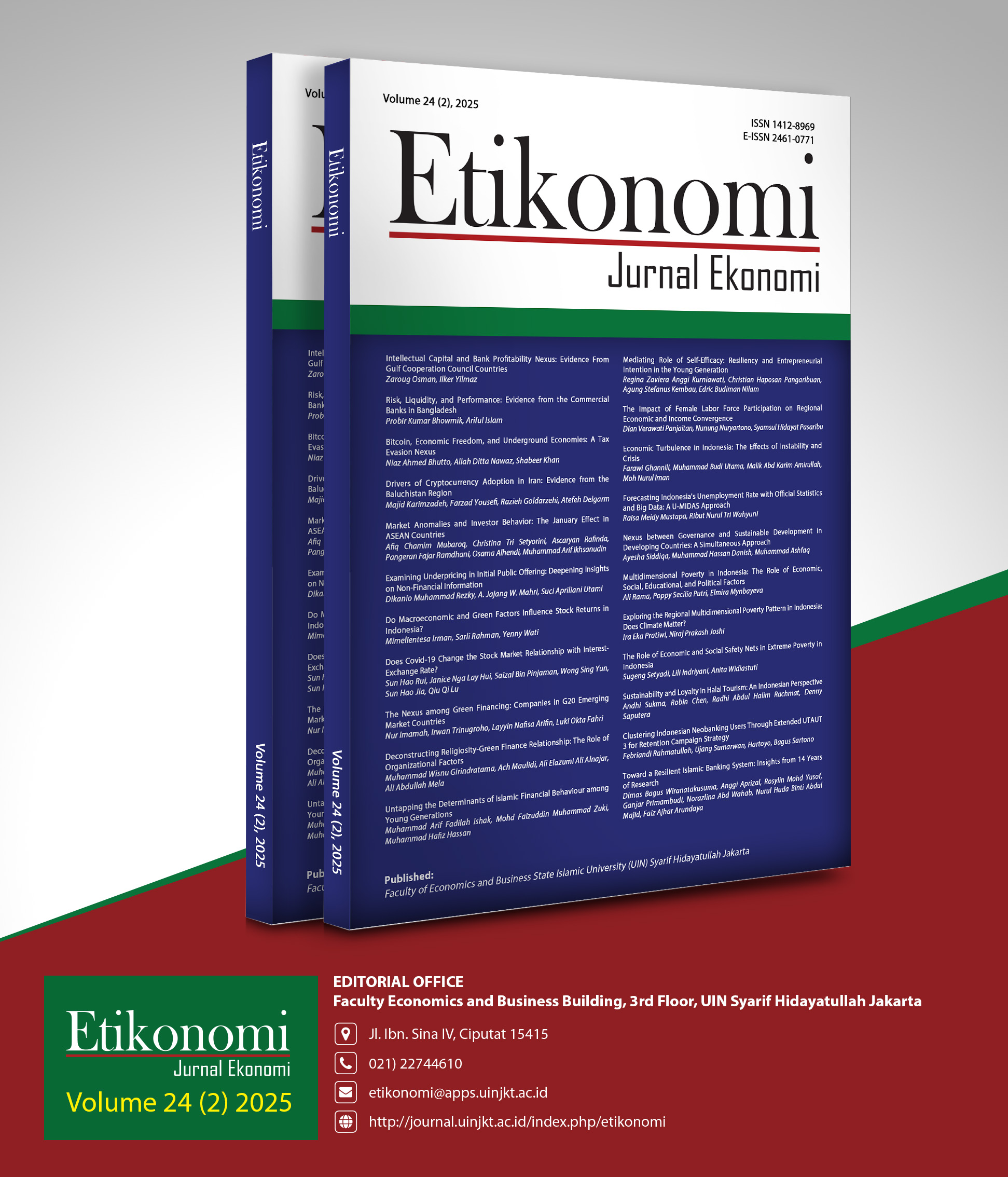Spiritual Values and Spiritual Practices: Interactive Effects on Leadership Effectiveness
DOI:
https://doi.org/10.15408/etk.v17i1.6497Keywords:
spirituality values, spiritual practices, leadership effectivenessAbstract
The relationship between spirituality and leadership effectiveness has been discussed over decades. These relations have been separated in two big perspective—first, an esoteric realm of intangible ideas and emotions; and second, a practical area and scientific inquiry. This research tries to integrate these two different perspectives. Specifically, this research examines the effects of spiritual values and spiritual practices on leadership effectiveness. The findings indicate that spiritual values and spiritual practices have positive effects on leadership effectiveness. This research also shows that spiritual values and spiritual practices have interactive effects on leadership effectiveness. This result implies that organizations should enhance the spiritual values and practices. Discussion, practical, and theoretical implications for further researches are offered.
Downloads
References
Alleyne, P., Cadogan-McClean, C., & Harper, A. (2013). Examining Personal Values and Ethical Behaviour Perceptions Between Accounting and Non-Accounting Students in the Caribbean. The Accounting Educators’ Journal. Vol. 23: 47–70.
Ashforth, B., & Pratt, M. (2014). Institutionalized Spirituality: An Oxymoron? In Giacalone, R.A., & Jurkiewicz, C.L. (Eds). Handbook of Workplace Spirituality and Organizational Performance. London: Taylor & Francis.
Baron, R. M., & Kenny, D. A. (1986). The Moderator–Mediator Variable Distinction in Social Psychological Research: Conceptual, Strategic, and Statistical Considerations. Journal of Personality and Social Psychology. Vol. 51(6): 1173-1182.
Barret, R. (2014). Culture and consciousness: Measuring spirituality in the workplace by mapping values. In Giacalone, R.A., & Jurkiewicz, C.L. (Eds). Handbook of Workplace Spirituality and Organizational Performance. London: Taylor & Francis.
Beheshtifar, M., & Zare, E. (2013). Effect of Spirituality in Workplace on Job Performance. Interdisciplinary Journal of Contemporary Research in Business. Vol. 5(2): 248–256.
Bodling, A., Heneghan, M., Walsh, J., Yoon, D., & Johnstone, B. (2013). The Brief Multidimensional Measure of Religiousness/Spirituality with an Irish sample: a Factor Analysis. International Journal of Therapy and Rehabilitation. Vol. 20 (2): 201-210. DOI: https://doi.org/10.12968/ijtr.2013.20.2.72
Bolman, L. G., & Deal, T. E. (2011). Leading with Soul: An Uncommon Journey of Spirit (3rd Ed). San Francisco, CA: Jossey-Bass.
Cavanagh, G.F. (1999). Spirituality for Managers: Context and Critique. Journal of Organizational Change Management. Vol. 12(3): 186–199. DOI: https://doi.org/10.1108/09534819910273793
Denison, D. R., Hooijberg, R., & Quinn, R. E. (1995). Paradox and performance: Toward a theory of behavioral complexity in managerial leadership. Organization Science, 6(5), 524–540.
Dik, B. J., Eldridge, B. M., Steger, M. F., & Duffy, R. D. (2012). Development and Validation of the Calling and Vocation Questionnaire (CVQ) and Brief Calling Scale (BCS). Journal of Career Assessment. Vol. 20(3): 242–263. DOI: https://doi.org/10.1177/1069072711434410
Dorn, A. W. (2001). Lotus on The Lake: How Eastern Spirituality Contributes to The Vision of World Peace. Journal of Oriental Studies. Vol. 11: 156–166.
Dyson, J., Cobb, M., & Forman, D. (1997). The Meaning of Spirituality: A Literature Review. Journal of Advanced Nursing. Vol. 26(6): 1183–1188.
Ehigie, B.O., & Akpan, R.C. (2004). Roles of Perceived Leadership Styles and Rewards in The Practice of Total Quality Management. Leadership and Organization Development Journal. Vol. 25(1): 24–40. DOI: https://doi.org/10.1108/01437730410 512750
Francis, R. E. (2013). Development of a Personality-Based Measure of Integrity. Saint Mary’s University, Canada. Retrieved from http://www.worldcat.org/title/development-of-a-personality-based-measure-of-integrity/oclc/851631159
Freeman, G. T. (2011). Spirituality and Servant Leadership: A Conceptual Model and Research Proposal. Emerging Leadership Journeys. Vol. 4(1): 120–140.
Fry, L. W. (2003). Toward a Theory of Spiritual Leadership. The Leadership Quarterly. Vol. 14(6): 693–727. DOI: https://doi.org/10.1016/j.leaqua.2003.09.001
Gupta, A., McDaniel, J. C., & Kanthi Herath, S. (2005). Quality Management in Service Firms: Sustaining Structures of Total Quality Service. Managing Service Quality: An International Journal. Vol. 15(4): 389–402.
Hair, J., Anderson, R., Black, B., & Babin, B. (2016). Multivariate Data Analysis. New Jersey: Pearson Education.
Hardt, J., Schultz, S., Xander, C., Becker, G., & Dragan, M. (2012). The Spirituality Questionnaire: Core Dimensions of Spirituality. Psychology. Vol. 3(1): 116-122. DOI: https://doi.org/10.4236/psych.2012.31017
Harrison, J. (1993). Spirituality and Nursing Practice. Journal of Clinical Nursing. Vol. 2(4): 211–217.
Javanmard, H. (2012). The Impact of Spirituality on Work Performance. Indian Journal of Science and Technology. Vol. 5(1): 1961–1966. DOI: https://doi.org/10.17485/ijst/2012/v5i1/30966
Josephson, M. S. (2002). Making Ethical Decisions (2002 edition). Marina del Rey, CA: Josephson Institute of Ethics.
Lee, K., Ashton, M. C., Morrison, D. L., Cordery, J., & Dunlop, P. D. (2008). Predicting Integrity with The HEXACO Personality Model: Use of Self- and Observer Reports. Journal of Occupational and Organizational Psychology. Vol. 81(1): 147–167. DOI: https://doi.org/10.1348/096317907X195175
Marques, J., Dhiman, S., & King, R. (2005). Spirituality in The Workplace: Developing an Integral Model and a Comprehensive Definition. Journal of American Academy of Business. Vol. 7(1): 81–91.
Maxwell, T. P. (2003). Integral Spirituality, Deep Science, and Ecological Awareness. Zygon®. Vol. 38(2): 257–276.
Melchar, D. E., & Bosco, S. M. (2010). Achieving High Organization Performance Through Servant Leadership. The Journal of Business Inquiry. Vol. 9(1): 74–88.
Mitroff, I. I., & Denton, E. (1999). A Study of Spirituality in the Workplace. MIT Sloan Management Review. Retrieved from https://sloanreview.mit.edu/article/a-study-of-spirituality-in-the-workplace/
Moxley, R. S. (1999). Leadership and Spirit (1st ed). San Francisco: Jossey-Bass.
Nadesan, M. H. (1999). The Discourses of Corporate Spiritualism and Evangelical Capitalism. Management Communication Quarterly. Vol. 13(1): 3–42.
Nasr, S. H. (1968). The Encounter of Man and Nature: The Spiritual Crisis of Modern Man. Michigan: George Allen & Unwin Limited.
Neal, J. A., & Bennett, J. (2000). Examining Multi-Level or Holistic Spiritual Phenomena in the Work Place. Management, Spirituality, and Religion Newsletter, Academy of Management, 1–2.
O’connell, K. A., & Skevington, S. M. (2005). The Relevance of Spirituality, Religion and Personal Beliefs to Health-Related Quality of Life: Themes from Focus Groups in Britain. British Journal of Health Psychology. Vol. 10(3): 379–398.
Rafferty, A. E., & Griffin, M. A. (2004). Dimensions of Transformational Leadership: Conceptual and Empirical Extensions. The Leadership Quarterly. Vol. 15(3): 329–354. DOI: https://doi.org/10.1016/j.leaqua.2004.02.009
Razwy, S. A. A. (2014). A Restatement of the History of Islam and Muslims. North Carolina: Lulu Press, Inc.
Reave, L. (2005). Spiritual Values and Practices Related to Leadership Effectiveness. The Leadership Quarterly. Vol. 16(5): 655–687. DOI: https://doi.org/10.1016/j.leaqua. 2005.07.003
Ting, S.-C. (2013). Service Fairness Scale: Development, Validation, and Structure. International Journal of Marketing Studies. Vol. 5(6): 25–36. DOI: https://doi.org/10. 5539/ijms.v5n6p25
Wagner‐Marsh, F., & Conley, J. (1999). The Fourth Wave: The Spiritually‐Based firm. Journal of Organizational Change Management. Vol. 12(4): 292–302. DOI: https://doi.org/10. 1108/09534819910282135
Yasuno, M. (2008). The Role of Spirituality in Leadership for Social Change. Spirituality in Higher Education Newsletter. Vol. 4(3): 1–4.
Zinnbauer, B. J., Pargament, K. I., Cole, B., Rye, M. S., Butter, E. M., Belavich, T. G., & Kadar, J. L. (1997). Religion and Spirituality: Unfuzzying the Fuzzy. Journal for the Scientific Study of Religion. Vol. 36(4): 549-554. DOI: https://doi.org/10.2307/ 1387689
Zohar, D. (2012). Spiritual Intelligence: The Ultimate Intelligence. London: Bloomsbury Publishing.














